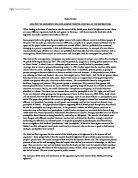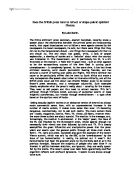ANALYSE THE ARGUMENTS FOR AND AGAINST TIGHTER CONTROL OF THE BRITISH PRESS
Media Studies
ANALYSE THE ARGUMENTS FOR AND AGAINST TIGHTER CONTROL OF THE BRITISH PRESS
When looking at the issue of whether or not the control of the British press should be tightened or not, there are many different arguments, both for and against. In this essay, I will discuss issues for both sides of the argument and make a personal conclusion at the end.
Some people believe that giving the press tighter control will restrict offences caused to individual people. If the press were to make up a story that was not 100% true, and print it in a paper, certain individuals may be upset and the paper/editor could get in trouble and accused of libel. Libel is a published false statement damaging to a person’s reputation: a false and defamatory written statement. An example of a case where a certain individual got offended was when it was published that Elton John had been sexually intimate with an underage boy. These claims turned out to be untrue and Elton John sued the newspaper that printed this.
This leads to the next argument, newspapers may write untrue statements and get away with it, thus leading to the public believing (technically) “lies”. This could be potentially dangerous as altering public opinions can lead to ‘Moral Panics’. A Moral Panic is a widespread public concern, usually fuelled by sensational media coverage, that an event or group is threatening society. In 1987, Cohen argued that the reaction of the media created what he called a moral panic. A moral panic exists when ‘a condition, episode, person or group of persons emerges to become defined as a threat to societal values and interests’. In this particular case, Cohen was referring to ‘Mods and Rockers’ who were later singled out as ‘Folk Devils’. Folk Devils are groups whose behaviour is seen as a threat to social order. Moral Panics occur on a regular basis. Newspapers (especially tabloid newspapers) often play a key role in their creation. They sensationalise issues by using emotive headlines, language and pictures. They present groups as stereotypes. They associate these groups with stereotypical behaviour. Contrasts are drawn between a glowing image of the past and a decline in modern standards and morals. Finally, the media clamour for a clampdown on the group, and/or the behaviour identified as a threat. The classic case to examine here would be paedophilia in the UK. Eight year-old Sarah Payne was abducted while playing near her grandparent’s house in West Sussex in 2000. When Sarah’s body was discovered, the News Of The World launched a campaign: How do you know if there’s a paedophile in your midst? The paper then published the names and photographs of 50 people it claimed had committed child sex offences, and promised: ‘we pledge we will pursue our campaign until we have named and shamed every paedophile in Britain. The paper produced figures suggesting 88% of British people thought that they should be told if a paedophile was living in their area. It also provided a website on which parents could use an interactive map to find their local paedophiles. It asked readers to report any convicted child abusers living within their area. From Plymouth to Portsmouth, Manchester and London, wrongly identified men and known paedophiles found themselves being hounded by mobs of up to 300 people. The crowds, 40 of which were later charged with offences, smashed windows, torched cars and forced five families, wrongly accused of harbouring sex offenders, out of their homes. A suspected paedophile in Southampton shot himself dead because neighbours had confused ‘paediatrician’ with ‘paedophile’. If there had been tighter control of the British Press this widespread moral panic would not have occurred, this can be seen as good or bad because during it, paedophiles were arrested.







